
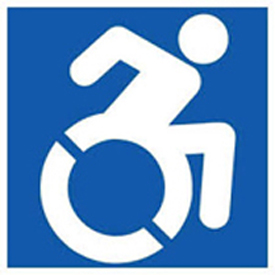
"I make every effort to live life to the fullest, despite being confined to a wheelchair, and dealing with life after an organ transplant. I hope the information contained in these pages will help others do the same."
Gordon Kirkland
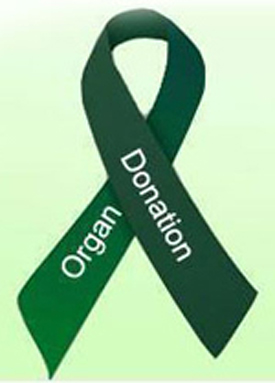
Traveling: Disability and Transplant Is No Excuse For Stay Home
As I prepare for another trip to the Caribbean, a place that, at this time last year, I thought I would never see again, I am thinking about all of the additional preparation it takes when you are a liver transplant recipient and a paraplegic. Diane and I will be heading to The Landings, in St. Lucia, the location for the filming of The Bachelor TV series on Saturday. Here are some tips for those of you considering such a trip:
Medications
- Always carry your medications in your carry-on luggage.
- Always bring at least a week’s worth of extra medication with you. (Remember the airline passengers who were stranded far from home after 9/11 in 2001?)
- Keep your medications in the room safe in your hotel
Airlines
- Check with your airline to see if they have a program to assist passengers with mobility issues or medical conditions. (Westjet has a fantastic program. See http://www.westjet.com/guest/en/help/special-needs.shtml)
- If you are in a wheelchair, arrive at the airport at least two I not three hours early. This gives the airline time to ensure the staff will be on hand to assist you to your seat.
- If you are catheter dependent, wear a larger leg bag, and avoid drinking too much during the flight. Airline lavatories are not wheelchair accessible (even for the airplane’s narrower aisle chair.) I switch from a 19oz. bag to a 32oz. bag.
Medical Insurance
- Always carry medical insurance when you are traveling out of the country. I use Pacific Blue Cross. Their policy has a rider covering pre-existing conditions.
- Do not book doctors appointments or lab tests in the eight days before you travel. Any change in your condition could make the coverage invalid.
Documentation
- Aside from your passport carry the following documents
- A travel letter from your transplant team detailing your medications. (It can come in handy if you asked about them at a customs, or if you have to visit a doctor or hospital.)
- Your most recent lab tests which are also useful in an emergency.
Precautions
- While the Caribbean is a sun worshiper’s paradise, anti-rejection medications make us more susceptible to melanoma. Take the following precautions:
- Wear loose fitting clothes with long sleeves, long pants and a hat with a brim.
- Wear sun blocking clothing (available from many online shops.) Shirts are often sold as rash-stop for preventing diver’s rash. Most have a sun protecting rating of 50 and above.
- Use a sun screen rated at least 30. The higher the better.
- There is a new mosquito-borne virus affecting some islands in the Caribbean and has even been found in Florida and elsewhere. (The Center for Disease |Control offers advice on its website at http://wwwnc.cdc.gov/travel/notices/watch/chikungunya-saint-martin.) Here is some advice for travelers to the region:
- Check to see how serious the problem is on the island you are visiting. It seems to be the worst in Dominica.
- Check to see if your hotel has a mosquito control program in place. (The Landings does.)
- Wear mosquito repellant when in areas where mosquitos are present. (We are carrying the Off Clip-On repellants and a spray on repellant.)
- Long sleeves and long pants are also helpful to prevent being bitten.
Food
- Be careful selecting restaurants. Do not eat from street vendors or beach vendors.
- Before you eat anything unusual, check to see if it reacts with any of your medications.
The most important thing to do is to remember to have a good time. While disease and disability can place some limitations on our lives, it need not be an excuse to hibernate. I have traveled throughout the Caribbean and elsewhere in the world since my spinal cord injury. I have been in schools of shark and stingrays, and even helped discover a wreck from the 16th Century off St. Kitts. Traveling post-transplant is a bit newer experience, but I have one trip to the Caribbean under my belt, and I’m looking forward to many more.
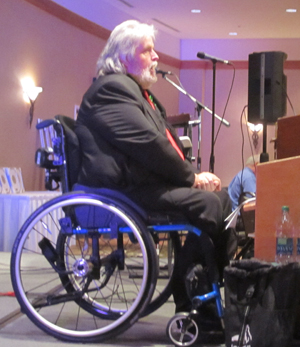

Gordon Kirkland Supports
The Following Organizations



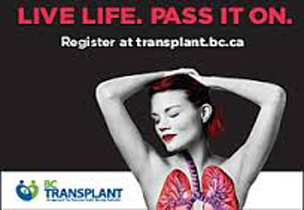
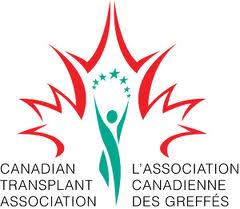
© 2011, Gordon Kirkland & At Large Publishing
Photographs by Diane Kirkland and Bal Dosanj
No part of this site may be copied without the expressed written permission of the copyright holders.